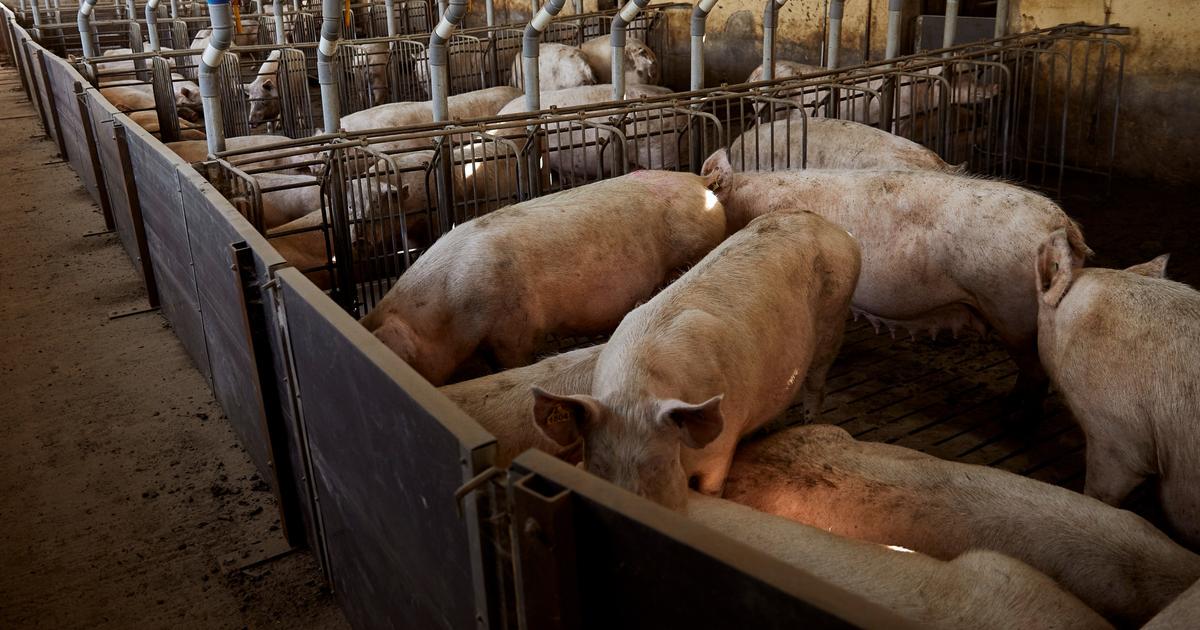The Mayan Train is not the only environmental problem that threatens the Yucatan Peninsula.
The territory, one of the most beautiful in the world, as the Mexican president repeats, also suffers from the slurry from pig farms, a growing industry that has infuriated the native peoples.
Homún, with just 10,000 inhabitants, is the symbol of a years-long struggle against a large farm that plans to raise 49,000 pigs.
The locality sought the refuge of the courts and managed to stop the project.
This Tuesday, a judge ratified the precautionary measure, but the process has not finished.
Andrés Manuel López Obrador has spoken this Wednesday, to questions from journalists, in favor of sustainable development of the pig industry in the area.
“They are jobs, food is produced,
but we must try not to damage the environment, not only in this, in everything”, he said.
The president has recalled when the peninsula did not meet the demand for pork and had to import "in canoes from Chiapas or Tabasco."
Today, they export.
Yucatan is not the largest producer of pork in Mexico, the country of carnitas, where about 1.7 million tons are produced per year.
And it still matters.
States like Jalisco or Sonora win that game, but among the big three, Yucatan is the one that has increased its production the most, with 3.9%, according to the latest data from an OECD study.
In addition, the conditions of the peninsula place it at a very high environmental risk.
The presence of water in the territory is ideal for installing the farms and there are 222 of the 257 in the entire peninsula, according to data from Greenpeace.
The green organization assures that there are many more, but without official registration.
Among those that have it, only 22 have the Environmental Impact Statement (MIA), according to a 2020 report by the organization. Yucatan is famous for its cochinita pibil,
In the Organization of Mexican Pork Producers (Opormex) they believe that the situation is not as catastrophic as they paint it.
"This in Yucatan is not a temporary problem, we have been working for years to establish good livestock practices in 100% of the farms with a central axis: environmental care and sustainability," says César López, general director of Opormex.
In the Yucatan peninsula, especially, "a strategy to strengthen environmental safety and circular economy is being developed," he says.
He regrets having been attacked by environmental organizations, but assures that the data they offer is imprecise.
Yucatan is the land of the cenotes, also famous throughout the world for their beauty.
They are round underground or open-air lagoons that were formed in the Pleistocene due to the calcareous characteristics of the soil.
The karstic terrain is porous and for this reason the natural wealth is doubly threatened by the slurry from the pigs.
Filtration into the water is not the only drawback, but also the deforestation that the settlement of pig farms implies, which can affect such emblematic species in Mexico as the jaguar, the spider monkey or the Yucatecan parrot, as well as an entire biodiversity that It takes place in caves.
In addition, the high concentrations of phosphorus and nitrogen burn the vegetation on the surface, as Greenpeace has documented.
"And there are other industries that add to this disaster," says Viridiana Lázaro,
The slurry problem is not unique in this North American country, far from it.
It occurs in much of Latin America, in Europe and in any part of the world where the pig is the main source of gastronomy.
In Spain it caused a tremendous political storm at the end of last year, when the Minister of Consumption, Alberto Garzón, spoke out against these intensive operations.
The opposition called for his resignation.
Garzón not only criticized environmental pollution, but also animal abuse and the poorer quality of meat that, he said, is produced on these farms.
"Due to their diet, pigs do not metabolize certain nutrients and 60% are excreted through feces and urine, releasing large amounts of nitrogen, phosphorus and contaminants for the soil and water into the environment," explains Lázaro.
Greenpeace took samples in 2020 "and all the levels came out higher than what is allowed by the standards." "We cannot isolate these components from those that come from other industries, but meat contributes to contamination, without a doubt," says the activist.
Deforestation due to the settlement of pig farms in Yucatan. Greenpeace/Robin Canul
A good part of the area where these farms have been installed in Yucatan are protected due to their high natural value.
This is the case of the cenote rings or the Yalahau lagoon, of enormous tourist interest.
Years ago, visitors from all over the world opted for this option, the inhabitants of Homún, who today see how their way of life is threatened by these industries and their bad smell.
On behalf of the children of the town, because childhood is more protected and it is understood that they are the most affected by this contamination in the future, lawsuits were filed in court to stop the macro-farm projected by the Kekén group, the largest producer and exporter Mexican pork meat to Asia and other parts of the world, under the motto of environmental sustainability.
A judge stopped the operation, which already had pigs, three weeks after starting activities, in 2018. The water treatment plant was not complete, the place was extremely vulnerable to the environment and the indigenous population had not been consulted, as is required, said the judge.
The case reached the Supreme National Court of Justice (SCNJ), after the challenge not only of the company, but also of the municipal presidency of Homún.
But the suspension was ratified, the same thing that happened, again this Tuesday, in a district court.
“Now we are waiting for the scientific opinions of the Attorney General of the Republic so that the judge can decide definitively,” says lawyer Lourdes Medina Carrillo, defender of the Indignation Team and the Mayan people of Homún, where 80% is dedicated to tourism.
The example of this town gained strength and now twenty towns have processes underway against pig farms.
"Many are questioning the damage to the soil and air pollution," says the lawyer from the Indignation Team.
“We are happy with the results so far, but remain cautious.
The problem is regional, we demand that the Ministry of the Environment and Natural Resources (Semarnat) specify the actions that it is going to undertake to avoid this problem.
We have requested meetings with them,” says Medina Carrillo.
"The sharecropper on this farm in Kekén is from an important family in Yucatan with influence in the media, so we have had to fight against the campaigns they launched," says the lawyer.
The permits to open one of these livestock farms cover the three levels of government, local, State and Federal.
"To give just one example, the Environmental Impact Statement in this Homún case had been signed by a dental surgeon," adds Viridiana Lázaro, from Greenpeace.
The environmental organization asks that not one more farm be installed in Yucatan or that the existing ones be expanded until there is a thorough review of those that already exist and water samples are taken.
In addition, they request that the communities be informed of each step that is taken so that they can make decisions about their territory, a privileged place in the world, which does not want to succumb to pig effluvium.
subscribe here
to the
newsletter
of EL PAÍS México and receive all the informative keys of the current affairs of this country



/cloudfront-eu-central-1.images.arcpublishing.com/prisa/XWDEWCZPBVCCDFB3VJU2TWK5PY.jpg)




